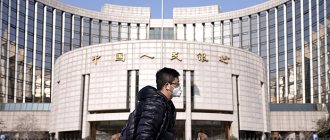Issuer
To become a successful investor, it is necessary not only to study the theory of searching for promising stocks, assembling a portfolio, calculating risks and payback periods, but also to understand the basic terminology of this field of activity.
The very first term, with which, in fact, the topic of securities begins, comes from the Latin word “emission,” that is, “issue,” and has long been firmly rooted in the financial sector. We are talking about the concept of “issuer”. What it is, what types there are and who it could be, we will analyze in detail in this article.
- What is an issuer
- Who can be an issuer
- Types of securities issuers State
- Local authorities
- Organizations conducting commercial and non-commercial activities
What is an issuer
Issuer concepts
Issuer
is a legal entity or government agency that issues securities (CB) and other financial assets. The purpose of the issue, that is, the issue, is to attract borrowed funds from a wide range of people. In essence, the issuer, for its own financial development, borrows from the population or other organizations and incurs corresponding obligations for these loans, which are clearly regulated by law and controlled by the regulator.
In addition to securities issues, there is money issue.
☝️
True, only the state has the exclusive right to issue banknotes, which bears obligations to the holders of banknotes and coins.
For example, the obligation to accept banknotes as a means of payment. But unlike securities, these obligations are not debt.
Depending on the purposes of attracting financing, the issuer can issue shares, checks, bonds, bills, savings and deposit certificates, etc. Regardless of the type of issuer, they all perform approximately homogeneous functions.
A detailed explanation in simple words of who an issuer is is given below:
Who is the issuer
What is traded on the stock exchange?
The exchanges offer various investment instruments. For example, stocks, mutual funds, bonds. We have already found out that securities are issued by issuers to attract capital. The issuer can offer the buyer a stake in its company by issuing shares. When you purchase shares, you automatically become a co-owner of the business. Of course, your share may be very small, but nevertheless you have certain rights. For example, when you purchase common stock, you have the right to participate in the management of the company. If you purchase preferred shares, you are entitled to a portion of the business's profits (dividends). Bonds work on a different principle. By placing bonds on the stock exchange, a company borrows money from investors with the promise of interest payments for use.
Who can be an issuer
Who can be an issuer
The securities legislation clearly states who can be an issuer. Only a legal entity can issue assets
, included in one of the following groups:
Government bodies.
Local government bodies.
Joint-stock companies and other organizations conducting commercial or non-commercial activities.
What all types of issuers have in common is that they have the same rights and obligations before the law. In addition, all organizations that issue any assets play an important role in shaping the investment market.
Individuals cannot be issuers of any assets.
Types of securities issuers
Types of issuers
Issuers can be classified according to industry, territorial characteristics, profitability and risks. Another option is by field of activity, for example, banks, manufacturing enterprises, insurance companies, investment funds, trading firms.
☝️
But the main classification of issuers still comes down to dividing them into types depending on the form of ownership and legal form.
As a result, three main categories are identified, essentially repeating the above list of those who can be an issuer.
State
State issuer
The most important and largest issuer, may have both internal and external obligations. Most often it issues bonds and bills with a certain maturity, which private and corporate investors can purchase on various platforms.
A large issue of government securities was presented in the history of the USSR. In the difficult post-war times, the state issued bonds, which the population bought out without fail. This type of emission was due to the extremely difficult situation in the economy. The state, as it were, borrowed money from the population with an obligation to return it. Our grandmothers and great-grandmothers kept such papers in bundles in chests, and most of them were never redeemed.
There is also another financial instrument that was created in post-perestroika Russia against the backdrop of a total budget deficit at all levels. GKOs - government short-term securities, were a real speculative instrument, its yield ranged from 30% to 250% per annum. The paper had a fixed validity period, the payment percentage was set at one year. Legal entities could buy GKOs, and they could be used in market circulation virtually without restrictions.
GKOs were issued to curb hyperinflation (850% in 1993) to limit uncontrolled money emission. At first, it was possible to pay income on state bonds due to negative actual income, and inflation was actually somewhat contained. But the Ministry of Finance could not resist the temptation of an “easy” budget replenishment, and the GKO market actually turned into a big soap bubble. “Financial pyramid named after Yeltsin” - this is what people call the history of GKOs. In 1998, the financial bubble burst, the GKO market collapsed and the country defaulted.
Central Bank of the Russian Federation
Today in the Russian Federation the state also issues instruments, the most famous of which can be called OFZ - federal loan bonds
. The income on them is slightly higher than the average on a bank deposit, but they are much more reliable. OFZs are issued for both legal entities and individuals, but are not in particular demand among the population. The negative experience of at least two generations is taking its toll.
☝️
It is interesting that foreign investors show great confidence in Russian government securities and consider them, although low-yielding, to contain almost no risk.
Government guarantees are considered the most reliable throughout the world. As an example, we can take the 2008 crisis. Then holders of corporate shares began to dump their assets en masse and buy US Treasuries. Therefore, when the market is “feverish” and most shares become cheaper, government-issued securities may even increase in price. This type of asset is good for those who do not strive to receive large incomes, but want to save what they have acquired with a high degree of probability.
Local authorities
Issue of banknotes
Regional and municipal authorities can also issue their own securities to borrow money from businesses and the public. In the 90s, almost every region, city, and sometimes village had its own bill of exchange. An increase in demand for such securities was noted in 1993 against the backdrop of general business interest in GKOs. After the default, the demand for such instruments fell sharply.
Today, municipalities also issue bonds or promissory notes. They are considered a slightly riskier instrument than government securities, but still quite reliable. It is assumed that default of a region or an individual municipality is almost impossible. It is assumed that the state will help pay off debts in the event of a crisis. That is, although indirectly, the securities of local governments fall under state guarantees.
Organizations conducting commercial and non-commercial activities
Issuing bank
This category is the most numerous
and plays a key role in shaping the investment market. Most often, the role of issuers is performed by joint stock companies - from large corporations to small companies.
Assets issued by this category of issuers are placed on stock markets through special platforms - exchanges. Such securities can be both a tool for fundamental investment and a speculative one for professional players on exchanges (traders).
Functions of issuers
What functions do issuers perform?
The main functions of issuers can be divided into two groups:
- Issue of securities in accordance with current legislation. The issuing company, at its own expense, organizes the issue of a security, its protection against counterfeiting, and its placement on stock exchanges and other platforms. The issuer issues different types of securities for different purposes. To attract additional financing - bonds or bills, to increase equity capital - shares.
- Ensuring obligations on securities - payment of dividends, timely repayment, information about the state of affairs in the company.
Stock exchanges in Russia
The first stock exchange in Russia was founded under Peter I in St. Petersburg. It was intended for trading goods. The first transactions related to securities began to be concluded in Russia at the beginning of the 19th century.
At the moment, the main exchanges in Russia are Moscow and St. Petersburg. The Moscow Exchange was opened in 2011. It provides access to the stock, derivatives and foreign exchange markets. The stock market carries out transactions related to securities - investment shares, shares, Eurobonds, corporate and regional bonds, OFZ, ETF, etc. Since 2013, it has also become possible to trade gold and silver on the Moscow Exchange.
On the St. Petersburg Exchange you can sell and buy securities of foreign companies. In addition, on the St. Petersburg exchange you can trade corporate bonds of Russian issuers, Eurobonds, and ETFs.
Rights and obligations of issuers
What issuers have the right to do
Almost any legal entity has the right to issue securities, regardless of the form of ownership. At the same time, the company acquires certain rights and obligations:
- Can conduct market activities using securities, make a profit and manage funds raised through the issue;
- Obliged to fulfill financial obligations under the terms of the transaction, exercise control over the legality of trading operations, and inform about the state of affairs in the company in the manner prescribed by law;
- Must disclose commercial information to investors (both existing and potential).
☝️
In the Russian Federation, the regulator, the Bank of Russia, monitors the fulfillment of the obligations of issuers. It supervises participants in the securities market, ensures that the rights of investors are not violated, and prevents possible market manipulation and the use of illegal operating schemes.
The regulator admits shares to the market and compiles registers of financial instruments. Since the regulator and the issuer are jointly and severally liable for some violations (for example, incorrect compilation of lists of shareholders), the actions of the Bank of Russia can be very harsh, including deprivation of a license and initiation of criminal proceedings against officials.
Disclosure of information by issuers
Do Issuers Have to Disclose Information
One of the responsibilities of issuers is to disclose information that may contain trade secrets.
☝️
First of all, this concerns accounting data. Quarterly and annual reports must be published on the information resources of exchanges.
As a rule, this data is located in the “Balance” section of each individual issuer.
Based on these data, investors can adequately assess the prospects for investing in these particular securities, their reliability, levels of profitability and risk. Balance sheet
- the main document on the basis of which most financial calculations are made.
☝️
This means that it will be very useful for a new investor to know the basics of accounting.
In addition to publishing economic indicators, issuers are required to publish facts about important corporate events. These include:
- Upcoming general meeting of shareholders;
- Liquidation, reorganization, termination of activities, renaming, rebranding;
- Information about additional issue;
- Splitting or merging shares.
Both public and non-public issuers are required to publish important information. Failure to fulfill these duties is an administrative offense and entails fines (Administrative Code of the Russian Federation, Article 15.19).
The largest exchanges in the world
New York Stock Exchange. We are sure that many of you know about it. This exchange is the largest in terms of turnover in the world. Its history dates back to 1792. Currently, there are strict listing criteria for issuers to be admitted to the New York Stock Exchange, so placing securities on it is considered prestigious. The stock exchange presents securities of the largest and most famous companies - for example, Bank of America, General Electric, Ford, etc.
NASDAQ. This is another largest US exchange, founded in 1938. The exchange has always relied on the technology sector, which soon allowed it to occupy its niche. Traditionally, when investors mention NASDAQ, they associate them with shares of high-tech companies such as Google, Facebook, eBay, and Intel. In addition, NASDAQ attracts companies for initial public offerings (IPOs).
Tokyo Stock Exchange. Included in the list of the largest and oldest exchanges in the world. Over 2,000 companies are registered on the site. Among them are automobile concerns Mazda, Mitsubishi, Toyota, as well as manufacturers of high-tech goods Nikon, Olympus, Casio, Sony.
Hong Kong Stock Exchange. This exchange offers investors services in three markets. Securities, futures, and metals are traded here. Typically, stock exchanges use symbolic tickers (short names for securities). For example, the YNDX ticker is used for Yandex, and GAZP for Gazprom. As for the Hong Kong Stock Exchange, its main difference is the presence of numerical tickers. For example, RUSAL shares are traded there under number 0486.
London Stock Exchange (LSE). The London Stock Exchange is divided into the main and alternative markets. To place securities in the main sector, the issuer must meet strict selection criteria. This market sector is considered the most prestigious. The alternative market is less demanding when it comes to listings. It houses securities of small and fast-growing companies.








